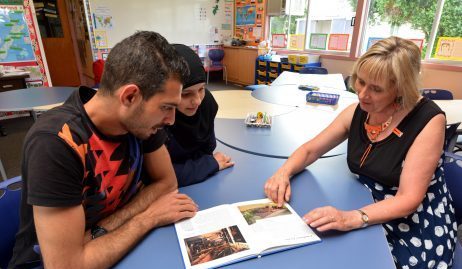
Between 2007 and 2016, Onondaga County became home to more than 9,500 refugees, consisting mostly of Burmese, Bhutanese and Somalian settlers[1]. That figure includes approximately 1,000 Iraqi and Afghan refugees who were affiliated with the United States military, as well as 250 refugees from the Syrian conflict[2]. A large portion of these refugees turned to local nonprofits for support to establish economic and social-self-sufficiency, long after the initial resettlement period.
English-as-a-New-Language (ENL) lessons and housing assistance are primary support services refugees have access to. While these services are critical, (70 different languages are spoken in the Syracuse City District[3]) and housing remains a difficult process, mental health services are far less common. The lack of adequate, culturally responsive mental health services is problematic as many arrive from countries where large scale violence, sexual assault and persecution are prevalent.
The consequences of these complex traumatic situations linger in the form of Post-Traumatic Stress Disorder (PTSD), anxiety, substance abuse depression, and challenges in family relationships. Refugees are approximately ten times more likely than non-refugees to have PTSD[4] and three times more likely to develop depression and anxiety[5], while access to mental health treatment is limited due to a number of factors including language barriers, stigma and lack of appropriate training of psychotherapists.
To address this, Dr. Rashmi Gangamma, associate professor of Marriage and Family Therapy at Syracuse University (MFT), approached the Multicultural Association of Medical Interpreters (MAMI) to identify ways in which some of these barriers could be reduced.
Through a series of meetings with MAMI and members of the New American community, an idea emerged for a collaborative approach targeting two needs: training psychotherapy students to deliver culturally informed psychotherapy for refugee populations and training language interpreters to effectively interpret psychotherapy sessions with individuals, couples and families.
“Throughout our work we’ve noticed each family member has experienced different traumas and circumstances and they don’t always adapt at the same speed,” said Gangamma. “It’s important for us to spend time with each family member including parents, children and even extended family to target their specific issues.”
The Central New York Community Foundation provided MFT with a $19,760 grant to launch a free training workshop that brings together interpreters in training from MAMI and her psychotherapy students at SU to learn and work collaboratively. The workshop, launched in January 2019, will utilize the grant to continue operations over a full one-year cycle.
The project will be completed in three phases. Phase one includes planning for the workshop with MAMI and community members; phase two is the actual workshop offered to both interpreters from MAMI and psychotherapy students at SU; and phase three involves a follow-up to assess the impact of the workshop.
“I believe training in conjunction with the community’s interpreters will be crucial for both interpreters and for mental health clinicians in our community,” said Shaelise Tor, a doctoral candidate at Syracuse University who has closely worked with Dr. Gangamma. “It’s been a great experience to work with a multidisciplinary team to craft this training, because we each bring our own areas of knowledge.”
The Marriage and Family Therapy Department at Syracuse University is the only provider of free family therapy services to the community in Syracuse and has been serving Onondaga County since 1969. The department maintains relationships with refugee centers in Syracuse including the Bhutanese Community Center and RISE to provide and assess the family therapy needs of those communities.
In collaboration with MAMI, who has served Central New York since 1998, MFT hopes to build a stronger relationship between its department, interpreters, and refugee populations to ensure long-term access to mental health solutions in Syracuse.
[1] CNY Vitals (https://www.cnyvitals.org/people/)
[2] CNY Vitals (https://www.cnyvitals.org/people/)
[3] Semuels, 2015, “The Refugees Who Come Alone”, (https://www.theatlantic.com/business/archive/2015/11/the-refugees-who-come-alone/415491/)
[4] Giacco & Priebe, “Mental Health Care for Refugees”, World Health Organization (http://www.euro.who.int/__data/assets/pdf_file/0006/293271/Policy-Brief-Migration-Health-Mental-Health-Care-Refugees.pdf)
[5] Hameed, Sadiq, & Din, 2018, “The Increased Vulnerability of Refugee Population to Mental Health Disorders” Kansas Journal of Medicine (https://www.ncbi.nlm.nih.gov/pmc/articles/PMC5834240/)

Recent Comments